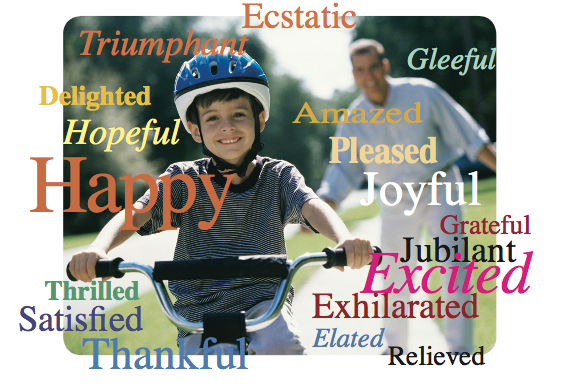Home & Family

Positive and negative experiences are a natural part of the ebb and flow of life with children. In our interactions with our children, each of us has the choice to respond in ways that either strengthen or weaken our relationships with them. Choosing the wiser response is influenced by our awareness of the internal states we experience— bodily sensations, emotions, thoughts—and of our personal values and strengths. Such self-awareness is something we can improve upon. This publication discusses the different aspects of self-awareness and the benefits that strengthening it can have for our relationships with our children.
Be aware of your rising emotions.
Emotions are first experienced in our bodies, usually before we are aware of what is happening. Our body sends us signals to alert us that “something is up.” These signals come in various forms: racing hearts, sensations of heat or cold, tension in our jaws or muscles, or butterflies in our stomachs, to name a few. If we pay attention, we can learn to recognize and interpret these sensations. The sooner we’re aware of our rising emotions, the better prepared we are to stay in control of our thoughts, words, and actions.
Some people, when they feel happy, notice a sensation of warmth in their chests. What are your body’s signals for happiness? What are your body’s signals when you are feeling nervous? Angry? Sad?
Accurately label your emotions.
Having a rich vocabulary of emotion words allows us to put labels on the sensations we experience. When we use emotion words that match our feelings, we alert the parts of our brains that can help us stay in control of ourselves. Being aware of and labeling our negative feelings increases the distance between our emotional states and our behaviors. This gives us extra time to figure out what to do to make things better. It helps us avoid getting stuck in the negative emotions that keep us from taking pleasure in our children and our relationships.
There are many words for emotions you can use to describe different degrees of these feelings. Sometimes you feel overjoyed, not simply happy. Frustrated, rather than mad. Not sad really, just a little down. What other feeling words do you know?
Know your values.
We have beliefs about what is right and wrong and what is worthwhile or unimportant. When we seek to align our behaviors with those beliefs, those beliefs become values. Calling to mind our values is an act of self-awareness that can serve as a check on our thoughts, words, and actions when interactions with our children become complicated.
“Don’t do to others what you don’t want others to do to you,” is an example of a well-known value about how to get along in life. What are the values you have as a parent?
Know your strengths.
On the path to adulthood, we develop personal strengths. These strengths can include qualities of mind such as creativity, open-mindedness, or perspective. Inner strengths refer to characteristics such as courage, persistence, or integrity. Interpersonal strengths include kindness and awareness of the needs and feelings of others. Fairness, gratitude, hope, and humor are just a few more examples in a long list of possible personal strengths. Awareness of our strengths reassures us that we have the resources to respond sensibly when the behaviors of our children push our buttons.
What are your personal strengths? Which of these strengths do you bring to your parenting?
Stay in touch with your self-confidence.
There are days when the challenges of family life leave us exhausted and wondering whether we know what we are doing at all. At such times, it’s helpful to step back and evaluate ourselves realistically and with compassion—in ways neither too harsh nor too flattering. We can use this self-reflection time to recognize the doubts that nag at us as well as the things we do well and to put our mistakes in perspective. It can help us regain a sense of self-confidence that is based not in perfection, but in the knowledge of the abilities we have and those we are still developing.
The sources of your self-confidence are rooted in your recognition of your abilities and the positive outcomes of your efforts. What are some things you have done that you take pride in or that have contributed to others?
When we make it a habit to tune in to our inner experience, we strengthen the ability to act from the core of our knowledge about our values, strengths, and sources of self-confidence. Bringing these self-understandings to the challenges of parenting is the foundation for remaining in control of ourselves so that we can choose our responses with care.
Sources for further reading:
Daniel Goleman, Emotional Intelligence,10th Anniversary Edition: Why it Can Matter,More than IQ. Bantam Books, 2005.
Christopher Peterson & Martin Seligman, Character Strengths and Virtues: A Handbook and Classification. Oxford University Press, 2004.
Daniel Siegel, The Developing Mind, Second Edition: How Relationships and the Brain Interact to Shape Who We Are
Ellen Abell, Extension Specialist, Associate Professor, Human Development and Family Studies, Auburn University
Reviewed November 2022, Parenting with Self-Awareness, HE-0952

